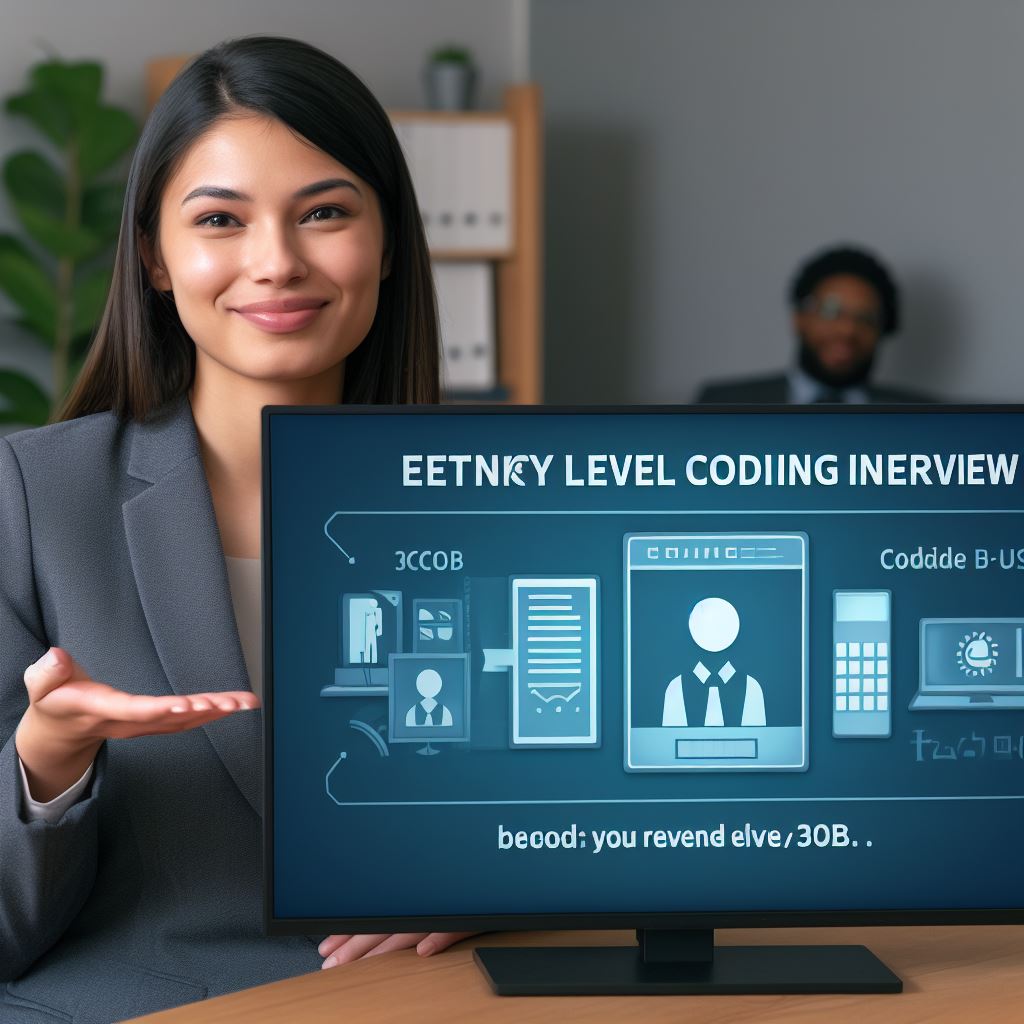Introduction
Briefly introduce entry-level coding jobs and the importance of effective interview strategies.
Interview Tips for Success
- Showcase Coding Skills: Demonstrate proficiency through coding exercises relevant to the job.
- Master Problem-Solving: Highlight problem-solving abilities with real-world examples.
- Communicate Clearly: Articulate thoughts effectively, emphasizing collaboration and teamwork skills.
- Research the Company: Exhibit knowledge about the company’s values, culture, and projects.
- Ask Questions: Show enthusiasm by asking insightful questions about the role and company.
- Practice Behavioral Questions: Prepare responses to common behavioral questions with STAR (Situation, Task, Action, Result) method.
Highlight the significance of interview tips in securing entry-level coding job offers and launching a successful career
Researching the Company
1. Company’s website
Visiting the company’s website is a crucial step in preparing for an interview.
Look for information about the company’s mission, values, and products or services.
Learn about the company’s history, key achievements, and any recent milestones.
Explore the company’s career section to get insights into their hiring process and culture.
2. Social media presence
Check the company’s social media profiles to gain more insights.
Follow their official accounts on platforms like LinkedIn, Facebook, Twitter, and Instagram.
Look for posts, updates, and engagement with their audience.
Pay attention to their company culture, community involvement, and employee testimonials.
3. Recent news or press releases
Search for recent news articles or press releases about the company.
Find out if they have launched new products, expanded to new locations, or won any awards.
Stay updated on their industry involvement, partnerships, or any notable achievements.
Show your interest by mentioning these recent developments during the interview.
Researching the company before the interview demonstrates your genuine interest and preparedness.
Tech Consulting Tailored to Your Coding Journey
Get expert guidance in coding with a personalized consultation. Receive unique, actionable insights delivered in 1-3 business days.
Get StartedIt allows you to tailor your answers to align with the company’s values and goals.
Identify potential pain points or challenges the company might be facing and brainstorm solutions.
Discovering common interests or shared values can help you establish rapport during the interview.
Researching also helps you formulate thoughtful questions to ask the interviewer.
Ask about the company’s future plans, potential growth opportunities, or team dynamics.
Engage in a dialogue rather than simply answering questions, showcasing your enthusiasm.
Remember, every bit of information you gather about the company can give you a competitive edge.
It allows you to stand out from other candidates and demonstrate your commitment.
Highlighting your knowledge of the company during the interview will impress the recruiter.
By understanding their values and goals, you can show how you can contribute to their success.
Researching the company thoroughly is an investment in your own success and increases your chances of securing the job offer.
Take the time to gather as much information as possible, and use it strategically during the interview.
Show that you have done your homework, and you will leave a lasting impression on the interviewers.
Remember, the more you know about the company, the more confident and prepared you will feel.
Build Your Vision, Perfectly Tailored
Get a custom-built website or application that matches your vision and needs. Stand out from the crowd with a solution designed just for you—professional, scalable, and seamless.
Get StartedResearching the company is a crucial step toward securing an entry-level coding job offer.
Read: Hello World in SQL: Starting with Database Queries
Familiarizing with Common Interview Questions
Explain the relevance of familiarizing with common coding interview questions
Familiarizing yourself with common coding interview questions is crucial for success in entry-level coding jobs interviews.
By understanding the types of questions typically asked, you can better prepare and increase your chances of securing an offer.
It allows you to showcase your technical skills, problem-solving abilities, and behavioral competencies.
Provide a list of common coding interview questions
1. Technical questions
Technical questions aim to assess your knowledge and understanding of coding languages and concepts. They may include:
- Explain object-oriented programming and provide examples.
- What are the differences between procedural and object-oriented programming?
- Describe the differences between front-end and back-end development.
- What is the purpose of version control systems, such as Git?
- How does a database work, and what is SQL used for?
2. Problem-solving questions
Problem-solving questions evaluate your ability to analyze and solve coding problems efficiently.
They require you to demonstrate your logical thinking, algorithmic skills, and attention to detail.
Examples include:
- Write a function to reverse a string.
- Implement an algorithm to detect whether a string is a palindrome.
- Design a program to find the maximum value in an array of integers.
- Create a function to calculate the factorial of a given number.
- Develop an algorithm to determine if two strings are anagrams.
3. Behavioral questions
Behavioral questions assess your personal attributes, problem-solving approach, and ability to work in a team.
They aim to understand your past experiences and how you handle different situations.
Common examples include:
- Tell me about a challenging project you worked on and how you overcame obstacles.
- Describe a situation where you had to work collaboratively with a team to achieve a goal.
- How do you handle constructive criticism and feedback?
- Can you give an example of a time when you demonstrated leadership skills?
- Tell me about a time when you had to prioritize tasks to meet a deadline.
Overall, familiarizing yourself with these common coding interview questions prepares you to confidently tackle different aspects of the job interview process.
It allows you to showcase your technical knowledge, problem-solving abilities, and behavioral skills, increasing your chances of securing an entry-level coding job offer.
Optimize Your Profile, Get Noticed
Make your resume and LinkedIn stand out to employers with a profile that highlights your technical skills and project experience. Elevate your career with a polished and professional presence.
Get NoticedRead: Creating 3D Coding Wallpapers with Blender Software
Reviewing Basic Coding Concepts
Highlight the need to review basic coding concepts
When preparing for entry-level coding jobs, it is crucial to review basic coding concepts.
Having a strong foundation in coding principles will not only impress interviewers but also enhance job performance.
By reinforcing essential coding concepts, you can increase your chances of securing a job offer.
Identify essential programming languages and concepts to focus on
- Object-oriented programming: Understanding OOP is fundamental for most entry-level coding positions.
- Data structures and algorithms: Familiarity with these concepts demonstrates problem-solving abilities and efficiency.
- Databases: Knowledge of databases is essential for managing and manipulating data in coding projects.
As you review these concepts, here are some tips to help you succeed in your interviews
- Stay updated with the latest coding principles and industry trends to showcase your commitment to learning.
- Practice coding exercises and challenges to enhance your problem-solving skills.
- Master at least one programming language in-depth instead of having superficial knowledge of multiple languages.
- Understand the practical applications of coding concepts by working on personal projects or contributing to open-source projects.
- Research the specific programming languages and concepts commonly used in your target industry and focus on those.
- Seek guidance from experienced software developers or coding mentors to clarify any doubts or misunderstandings.
- Take advantage of online learning resources, such as coding tutorials, video courses, and coding bootcamps, to supplement your knowledge.
- Test and debug your code thoroughly to demonstrate your attention to detail and ability to produce high-quality work.
- Be prepared to discuss and explain coding concepts during your interviews, showcasing your understanding and communication skills.
- Showcase your ability to work well within a team by participating in group coding projects or collaborating with other developers.
By focusing on these essential programming languages and concepts and implementing these tips, you can greatly improve your chances of securing an offer for an entry-level coding job.
Remember, the interview process is not only about showcasing your technical skills but also your enthusiasm, problem-solving abilities, and ability to work well within a team.
Take the time to review and practice coding concepts, and you’ll be well-prepared to ace your interviews and kickstart your career in coding.
Read: Learn to Code: Writing ‘Hello World’ in Ruby

Preparing for Technical Assessments
Discuss the prevalence of technical assessments in coding job interviews
Technical assessments have become increasingly common in coding job interviews due to the demand for skilled coders.
Provide tips on how to prepare for technical assessments
Preparing for technical assessments requires practice, joining coding bootcamps, and leveraging online resources.
Practice coding problems regularly to strengthen your problem-solving skills and understanding of different algorithms.
Consider joining coding bootcamps or online coding platforms to receive structured guidance and gain hands-on experience.
Make use of online resources, tutorials, and coding challenges to improve your coding abilities and stay updated with industry practices.
Read: The Importance of Portfolio Projects for Entry-Level Coders
Displaying Projects and Relevant Experience
It is crucial to highlight your relevant projects and experience to secure an entry-level coding job.
Here are some effective ways to showcase your projects and experience during an interview:
Create a compelling portfolio website
Your portfolio website should showcase your best projects and demonstrate your coding skills.
It should have an organized layout and easily accessible project descriptions.
Prepare project explanations and demo materials
Before the interview, make sure you have a clear understanding of the projects you want to showcase.
Prepare concise explanations highlighting the problem, your solution, and the technologies/frameworks used.
Additionally, have demo materials ready, such as code snippets or screenshots.
Highlight teamwork and collaboration experiences
Entry-level coding jobs often require working in a team environment.
Therefore, during the interview, emphasize your experiences working collaboratively on projects.
Discuss how you contributed, communicated, and resolved conflicts within a team setting.
By effectively showcasing your projects and experience, you can impress potential employers and increase your chances of securing an entry-level coding job.
Enhancing Non-Technical Interview Skills
Recognize the significance of non-technical interview skills
Non-technical interview skills play a crucial role in securing an entry-level coding job.
These skills demonstrate an applicant’s ability to effectively communicate, problem-solve, and collaborate with others.
Suggest key non-technical skills to focus on
Communication and interpersonal skills
Effective communication is essential in conveying technical information to both technical and non-technical stakeholders.
Additionally, good interpersonal skills help foster positive relationships with colleagues and clients.
Problem-solving and critical thinking abilities
Employers look for candidates who can think critically and solve complex problems.
Showcase your ability to analyze situations, identify problems, and provide innovative solutions.
Adaptability and teamwork
Demonstrate your adaptability by showcasing instances where you successfully adjusted to new technologies or work environments.
Emphasize your ability to work collaboratively in a team, as coding projects often require teamwork.
By focusing on these key non-technical interview skills, you can enhance your chances of securing an entry-level coding job.
Remember to provide specific examples from your past experiences to illustrate these skills during the interview process.
Dressing and Behaving Professionally
A successful interview not only depends on your coding skills and experience but also on your professional appearance and behavior.
Employers are looking for candidates who can fit into the company culture and represent the organization in a positive light.
Here are some tips to help you dress and behave professionally during an interview:
Stress the Importance of Professional Appearance and Behavior
- First impressions matter: Your appearance and behavior create a lasting impression on the interviewer. Dressing and behaving professionally show that you take the opportunity seriously.
- Reflect company values: Professional appearance and behavior indicate that you understand and respect the company’s culture, values, and expectations.
- Confidence booster: Presenting yourself professionally can boost your confidence, making you more comfortable and poised during the interview.
Tips on Dressing and Behaving Professionally
Dress appropriately for the company culture:
- Research the company’s dress code and choose an outfit that aligns with it.
Dressing slightly more formal than the usual attire shows respect and professionalism. - Avoid overdressing or underdressing.
Find the balance and dress comfortably, ensuring your clothes are clean, wrinkle-free, and well-fitted. - Pay attention to grooming.
Clean, combed hair and neat facial hair (if applicable) contribute to a polished appearance.
Maintain professional body language and posture
- Stand and sit up straight to display confidence and engagement.
Poor posture can make you appear disinterested or unprofessional. - Make eye contact with the interviewer to show attentiveness and interest.
Avoid excessive fidgeting or crossing your arms, which can indicate nervousness or defensiveness. - Offer a firm handshake when greeting the interviewer, accompanied by a genuine smile.
A handshake can demonstrate your confidence and professionalism.
Show enthusiasm and confidence
- Be engaged and show enthusiasm for the opportunity.
Smile, listen attentively, and respond positively and confidently to questions. - Use confident body language, such as nodding affirmatively, mirroring the interviewer’s gestures, and using hand gestures when appropriate.
- Project a positive attitude and showcase your passion for coding.
Employers want to see that you are enthusiastic about the field and eager to contribute.
Remember, dressing and behaving professionally during an interview can set you apart from other candidates and leave a lasting impression.
It demonstrates that you take the opportunity seriously, understand the company culture, and possess the necessary skills to succeed.
By following these tips, you can present yourself as a professional and confident candidate, increasing your chances of securing that entry-level coding job.
Practicing and Rehearsing
A crucial aspect of securing an entry-level coding job is to effectively practice and rehearse for interviews.
By doing so, you can enhance your confidence, prepare for potential questions, and impress the interviewer with your knowledge and skills.
Here are some suggestions on how to practice effectively:
Emphasize the benefit of practicing and rehearsing for interviews
Practicing and rehearsing for interviews is essential as it allows you to refine your responses, improve your communication skills, and build your confidence.
It helps you become familiar with the interview process and makes you well-prepared for any unexpected questions that may arise.
Provide suggestions on how to practice effectively
To practice effectively for coding job interviews, consider the following techniques:
Conduct mock interviews with peers or mentors
Mock interviews with peers or mentors provide a realistic simulation of the actual interview process.
They enable you to practice answering technical questions, improve your problem-solving abilities, and receive valuable feedback and suggestions for improvement.
Utilize online interview preparation platforms
Online interview preparation platforms offer a wide range of resources, including practice questions, coding challenges, and video tutorials.
These platforms allow you to simulate interview scenarios and evaluate your performance.
Take advantage of these tools to identify areas for improvement and enhance your coding skills.
Ask for feedback and improve accordingly
Feedback is crucial for growth and improvement.
After completing mock interviews or utilizing online platforms, seek feedback from your peers, mentors, or professionals in the industry.
Ask for their honest opinions on your performance, communication skills, and technical knowledge.
Use their feedback to refine your answers and identify areas that need further development.
By implementing these suggestions, you can practice effectively and boost your chances of securing an entry-level coding job.
Remember, practice makes perfect, and investing time and effort into preparation will significantly increase your confidence and performance during interviews.
Conclusion
Interview tips play a crucial role in securing entry-level coding job offers.
By following the outlined tips, job seekers can enhance their chances of success in the competitive job market.
Proper preparation, showcasing relevant skills, and displaying a positive attitude are all essential aspects of a successful coding job interview.
It is important to remember that the interview process is an opportunity to stand out from other candidates and impress potential employers.
By being well-prepared, displaying enthusiasm, and effectively communicating your abilities, you can increase your chances of securing a job offer.
We encourage readers to implement the interview tips discussed in this section and apply them to their job search.
With consistent effort and dedication, success can be achieved.
Good luck to all job seekers in their pursuit of entry-level coding jobs.
Remember, you have what it takes to succeed!




